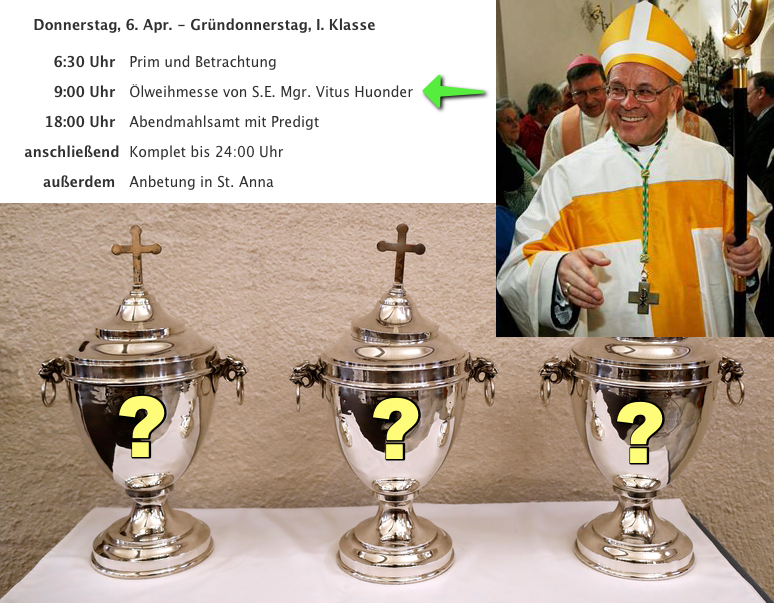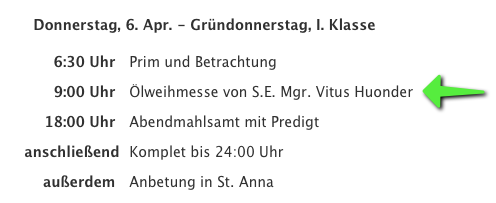Lefebvrists playing with fire…
SSPX Holy Oils consecrated by Novus Ordo Bishop —
Invalid Last Rites coming soon!

[UPDATE Apr. 18: Photo clearly showing ‘Bishop’ Huonder conducting the Chrism Mass ceremony emerges.]
[UPDATE Apr. 8: SSPX German District publishes 19 photos of Chrism Mass in Zaitzkofen, ‘Bp.’ Huonder’s face not visible in any of them. Accompanying text does not mention his name either (or that of anyone else). The SSPX is hoping you won’t ask or care to know who the ‘bishop’ was.]
[UPDATE Apr. 6: GloriaTV reports the ceremony took place as scheduled, with ‘Bishop’ Huonder ‘consecrating’ the holy oils in Germany. In the United States, thankfully, the holy oils were consecrated by Bp. Alfonso de Galarreta, so at least those are valid.]
We have said it again and again: Theology has consequences.
In the case of the Society of St. Pius X (SSPX or FSSPX), founded by Archbishop Marcel Lefebvre in 1970, faulty theology may now lead to the invalid administration of the sacraments of confirmation and extreme unction (last rites/anointing of the sick) for countless individuals. And that, in turn, could effectively mean the difference between an eternity in heaven or in hell, depending on other circumstances.
The official web site for the international SSPX seminary in Zaitzkofen, Germany, has announced on its liturgical calendar that this year’s Chrism Mass is scheduled for 9:00 am on April 6, 2023. The Chrism Mass is the Mass at which the bishop blesses or consecrates three kinds of holy oils — the Oil of the Sick, the Oil of Catechumens, and Holy Chrism — that are used in various sacraments and sacramentals. Traditionally, it always takes place on Holy Thursday.
So far, so good then. The problem is with the scheduled celebrant. The SSPX calendar states that the Chrism Mass will be celebrated by ‘His Excellency’ Vitus Huonder, a retired Novus Ordo bishop from Chur, Switzerland, who has been with the SSPX since 2019:

Why is this a problem? Because Vitus Huonder was ‘consecrated a bishop’ on Sep. 8, 2007, in the invalid Novus Ordo rite of ordination promulgated by ‘Pope’ Paul VI in 1968. Furthermore, even Huonder’s ordination as a priest is suspect, because it too occurred in the Novus Ordo rite, as he was ordained on Sep. 25, 1971.
Although the 1968 rite of priestly ordination may be valid, the rite of episcopal consecration (bishop’s ordination) definitely is not, as we have demonstrated on this web site in the past:
- Unholy Orders: 50 Years of Invalid Ordinations in the Novus Ordo Church
- They Are Really Not Bishops: Response to Rev. John Hunwicke on Novus Ordo Episcopal Consecrations
- The New Ordination Rite: Purging the Priesthood in the Conciliar Church
In other words, the SSPX holy oils may very well get blessed by a layman tomorrow — by a layman in fancy robes perhaps, or, at best, by a priest, but certainly not by a valid bishop.
This is a needless tragedy of colossal proportions, and as of the writing of this post, it could still be averted.
The SSPX has three bishops among its ranks that were validly consecrated by Abp. Lefebvre in 1988: Bp. Bernard Tissier de Mallerais, Bp. Alfonso de Galarreta, and Bp. Bernard Fellay. (The fourth of them, Bp. Richard Williamson, was expelled in 2012.) Any one of these three bishops could consecrate the holy oils, but alas, in Zaitzkofen it will be Mr. Huonder.
Why is it so important that these holy oils be consecrated by a real bishop?
The short answer is that the oils are part of the necessary matter for the sacraments of confirmation and extreme unction (last rites/anointing), meaning that without them, these sacraments cannot be conferred validly. Only if the oils have been consecrated by a true bishop are they valid matter for these sacraments. (Although holy oils are used also in other sacramental rites, such as baptism and ordination, there they are not necessary for validity.)
This is taught, for example, by the Council of Trent:
This sacred unction for the sick, however, was instituted by Christ our Lord as truly and properly a sacrament of the New Testament, alluded to in Mark [Mk 6:13], indeed, but recommended to the faithful and promulgated by James the Apostle and brother of the Lord. “Is any man,” he says, “sick among you?” “Let him bring in the priestsof the Church, and let them pray over him, anointing him with oil in the name of the Lord and the prayer of faith shall save the sick man, and the Lord shall raise him up; and if he be in sins, they shall be forgiven him” [Jas 5:14,15]. In these words, as the Church has learned from apostolic tradition transmitted from hand to hand, he teaches the matter, form, proper ministration, and effect of this salutary sacrament. For the Church has understood that the matter is the oil blessed by the bishop, since the unction very appropriately represents the grace of the Holy Spirit, with which the soul of the sick person is visibly anointed; and that these words are the form: “By this anointing, etc.”
(Council of Trent, Session 14; Denz. 908; underlining added.)
Thus it is clear how much hinges on Vitus Huonder being a valid bishop. Even people who are not convinced that the new ordination rites are clearly invalid, will have to admit that the evidence is so strong that there is sufficient doubt as to their validity, meaning they must in practice be treated as if they were certainly invalid.
In the past, the SSPX itself questioned the validity of Novus Ordo ordinations. It was not until late 2005, after Joseph Ratzinger had begun claiming to be the Pope (Benedict XVI), that the SSPX published articles arguing for the validity of Paul VI’s ordination rites. (The fact that new ‘Pope’ himself had been ‘consecrated a bishop’ in the new rite was surely mere coincidence.)
In fact, Bishop Tissier de Mallerais himself still does not accept the validity of the Novus Ordo rite of priestly ordination and, by extension, that of episcopal consecration, which was tampered with a lot more than the priestly ordination rite:
While some may suspect that this whole controversy over ‘Bp’. Huonder is simply a bunch of sedevacantists trying to cause a stir during Holy Week, purely out of hostility towards the Lefebvrists, nothing could be further from the truth. This is about the validity of confirmation and extreme unction, two very important sacraments which have the power to fortify and save many souls.
Since in danger of death, extreme unction may be received even from an SSPX priest, this potentially concerns everyone, including sedevacantists. Besides, we certainly want those who adhere to SSPX traditionalism in good faith (i.e. by sincere mistake) to receive valid confirmation and last rites regardless.
It is our hope and prayer that this post may contribute to the SSPX changing course at the last minute and having one of their own bishops substitute for the Swiss Novus Ordo cleric instead.
It will be a disaster of incalculable proportions if the holy oils in Zaitzkofen are ‘consecrated’ by ‘Bp.’ Huonder this year. May God prevent it!
Image source: composite with elements from FSSPX.today, Keystone, and Shutterstock (godongphoto)
License: fair use, fair use, paid



No Comments
Be the first to start a conversation